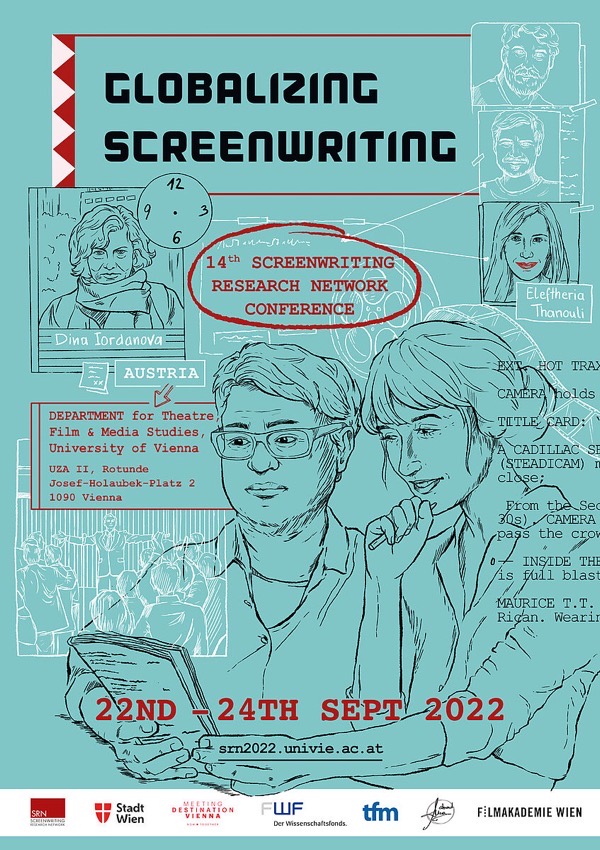Transcript:
But that’s also something I tell people to do. Read scripts. Of course, watch TV shows and break them down right? Watch the show and go scene by scene right? What’s the A story the B Story, the C story? If it’s “Gray’s Anatomy” it’s D E F G you could do the whole alphabet right? Watch how many scenes in an act. Every Act breaks on the A story. Get that structure in your head so if you’re going to write that episode or show like it you’re gonna understand that. So you can either get that from reading the scripts and there’s so much free online now. Whenever the Emmys or stuff come out they do free PDFs because they want you to read the scripts. You can learn so much from looking at how other people have done it.
One of the benefits of attending conferences is that you can meet the editors from the companies that have published some of your books face to face. That happened at the recent SCMS conference where I met Intellect editor James Campbell and he invited me to be a guest on his InstagramLive show.
We chatted about my work with the Stephens College MFA in TV and Screenwriting, and then my work with co-editor Rose Ferrell on the Journal of Screenwriting’s special issue on Women in Screenwriting (Volume 11, Number 3) that came out recently and which featured articles about an international set of female screenwriters from Syria, Argentina, China and Canada (to name a few).
We even had time to nerd out on our own favorite classic films across the eras which brought up fun memories of Angels with Dirty Faces, Back to the Future, Bonnie and Clyde, and of course, all things Star Wars from the original 3 to The Mandalorian. It’s always so fun to talk to fellow cinephiles.

Watch this entire presentation
With Intellect Books Editor James Campbell (@IntellectBooks)
Speaking with Dr. Rosanne Welch, Author, teacher, and television screenwriter. Today we cover everything from women in screenwriting to our favorite Jimmy Cagney movies and Friends.
Podcast: Play in new window | Download
Subscribe: RSS
![33 Read and Study Script from In Conversation with Dr. Rosanne Welch [Video]](https://rosannewelch.com/wp-content/uploads/2022/11/rmw-intellect-33.jpg)

![04 More On Suso Cecchi d'Amico From Jeanne to Suso to Julie to Spike: How Jeanne Macpherson’s Manual on Screenwriting Influenced Italian Realism which Influenced Black Independent Film in the U.S. [Video]](https://rosannewelch.com/wp-content/uploads/2022/11/rmw-srn-vienna-2022-04.jpg)



![32 Binging TV with Torchwood from In Conversation with Dr. Rosanne Welch [Video]](https://rosannewelch.com/wp-content/uploads/2022/10/rmw-intellect-32.jpg)
![03 Jeanne Macpherson & Suso Cecchi d'Amico From Jeanne to Suso to Julie to Spike: How Jeanne Macpherson’s Manual on Screenwriting Influenced Italian Realism which Influenced Black Independent Film in the U.S. [Video]](https://rosannewelch.com/wp-content/uploads/2022/10/rmw-srn-vienna-2022-03.jpg)
![Presenting at San Diego Who Con via Instagram [Photography]](https://rosannewelch.com/wp-content/uploads/2022/10/2022-10-22-14.20.48-1.jpg)
![Ready to present at San Diego Who Con via Instagram [Photography]](https://rosannewelch.com/wp-content/uploads/2022/10/2022-10-22-13.41.12.jpg)
![31 Mystic Popup Bar and Binging TV from In Conversation with Dr. Rosanne Welch [Video]](https://rosannewelch.com/wp-content/uploads/2022/10/rmw-intellect-31.jpg)
![02 Who was JeanneMacpherson? From Jeanne to Suso to Julie to Spike: How Jeanne Macpherson’s Manual on Screenwriting Influenced Italian Realism which Influenced Black Independent Film in the U.S. [Video]](https://rosannewelch.com/wp-content/uploads/2022/10/rmw-srn-vienna-2022-02.jpg)
